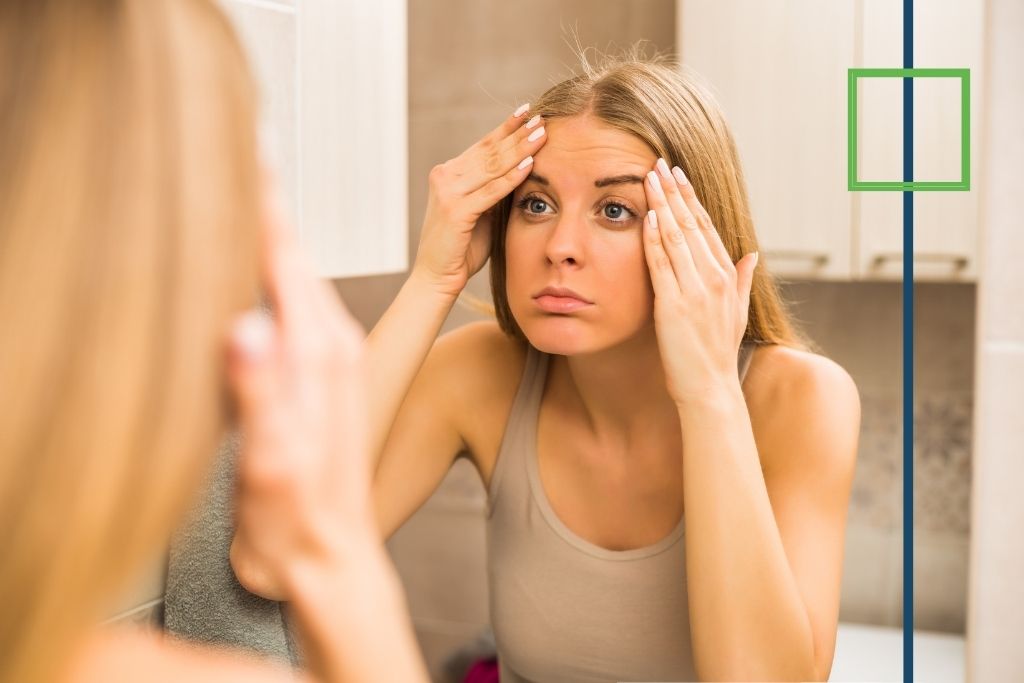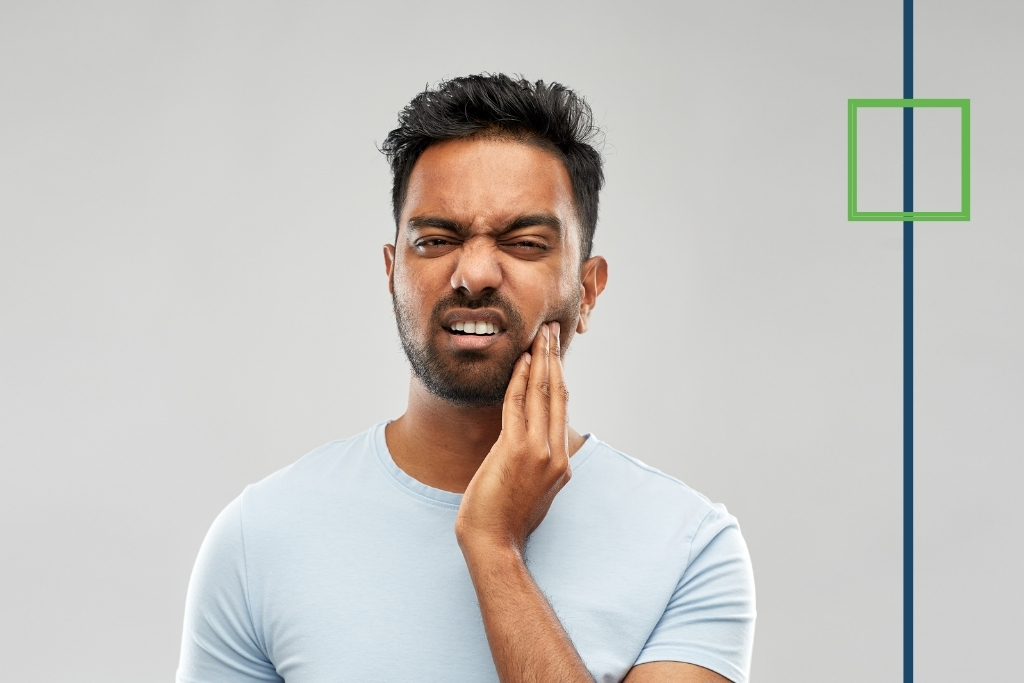How Alcohol Affects Your Appearance?
Regardless of the type of alcoholic drinks you ingest, the fact is that alcohol contains mood-altering chemicals that function to make changes throughout the body. For example, one of the immediate effects of alcohol on the face would be getting flushed or turning red. As a result, many people get a red blotchy face after drinking alcohol—even to the extent where others can tell if you are intoxicated just by looking at your flushed, warm skin.
In many of these situations, having a red face from the alcohol goes away once you sober up or sleep off the night of drinking. However, there are cases where alcohol-related face changes don’t go away so quickly. This often happens in heavy, chronic drinking situations, otherwise known as alcoholism [1].
For individuals who struggle with alcohol abuse, the alcohol face changes often are trickier to deal with. This happens because alcohol changes the way that the blood vessels in the body function. Alcohol causes blood vessels to expand and tighten, thus pumping blood to spots where the skin is thinner, like the face. This can lead to red, ruddy cheeks.


Get Your Life Back
Find Hope & Recovery. Get Safe Comfortable Detox, Addiction Rehab & Mental Health Dual Diagnosis High-Quality Care at the We Level Up Treatment Centers Network.
Hotline (877) 378-4154Appearance Effects of Alcohol – Face
Also, alcohol naturally induces swelling. Therefore, alcohol face bloat happens. Having a puffy face from alcohol consumption is more than just an appearance or cosmetic issue, though that can definitely hurt your self-esteem. These permanent alcohol face changes can change the skin’s texture and feel.
Alcoholic nose, for instance, is one of the alcohol-related face changes that can result in severe, long-lasting dermatological concerns. Alcohol can also activate a flare of rosacea. Both of these conditions can leave you with skin that is:
- Red
- Irritated
- Itchy
- Painful
- Swollen
Unfortunately, these conditions and symptoms are not easily reversed. In fact, sometimes, a red face after drinking alcohol can tell much more severe issues ahead. The best way to approach clearing up your alcohol-related face changes is to stop drinking for good. This means finding an inpatient alcohol treatment program that will help you with all of the emotional and physical side effects of alcoholism.
Appearance Effects of Alcohol – Skin
Alcohol consumption results in two things. Inflammation and dehydration. We will discuss the details on how dehydration and inflammation affect the skin and why you might want to quit drinking.
The Effects of Dehydration from Alcohol:
- Loss of elasticity, leading to wrinkles and sagging skin
- Dryness
- Dullness
- Enlarged pores
Alcohol is known to dehydrate the skin, depriving it of the moisture and nutrients it needs to keep our complexion looking radiant, supple, and youthful. Alcohol removes the fluid in the skin, which can increase the appearance of dryness, wrinkles, and sagging skin.
As alcohol is a diuretic, it means that it actively draws water away from the body, significantly lowering the body’s water level, therefore causing dehydration. Dehydrated skin can look dry and unhealthy, both in the color of the skin as well as the texture.
Dehydration can also lead to congestion. Dehydration due to alcohol can also dilate the pores of the skin, leading to an increase in blackheads and whiteheads. If this is poorly treated, it can go on to cause acne and rosacea. In the long term, this ages skin and can cause permanent scarring [2].
The Effects of Inflammation from Alcohol
- Increased redness or flushing of the skin
- Acne
- Blotchiness
- Puffiness
- Rosacea
Alcoholic drinks, especially wine and cocktails, are incredibly high in sugar, and this will show in your skin if you are consuming more than the recommended amount. Sugar [in alcoholic drinks] has been shown to activate the hormone IGF-1, which causes an overproduction of oil in your skin, increasing your chances of breakouts or acne.
If you suffer from the skin condition rosacea, it’s most likely that alcohol will worsen your symptoms. Rosacea is a disease that is activated by alcohol consumption – mainly red wine – as it’s an inflammatory condition, so when we drink alcohol we’re increasing chances of a flare-up.

Ingesting alcohol is also a culprit for causing inflammatory signals within the skin causing redness and flushing due to its vasodilatory effect (it opens up the blood vessels and increases the blood flow above the normal levels. Alcohol is also known for leading puffiness across the face. Rosacea, a challenging chronic inflammatory condition of the skin is very commonly triggered and driven by alcohol.
With continued alcohol intake, alcohol misuse can cause jaundice, pruritus (itchy skin), pigmentary alterations, urticaria (hives), hair and nail changes, and oral changes. It is also a risk factor for skin cancer and infections. Alcohol is certainly a substance that should be taken in moderation or better yet, not at all.
Ingesting alcohol is also a culprit for causing inflammatory signals within the skin causing redness and flushing due to its vasodilatory effect (it opens up the blood vessels and increases the blood flow above the normal levels. Alcohol is also known for leading puffiness across the face. Rosacea, a challenging chronic inflammatory condition of the skin is very commonly triggered and driven by alcohol.
With continued alcohol intake, alcohol misuse can cause jaundice, pruritus (itchy skin), pigmentary alterations, urticaria (hives), hair and nail changes, and oral changes. It is also a risk factor for skin cancer and infections. Alcohol is certainly a substance that should be taken in moderation or better yet, not at all.
Get Help. Get Better. Get Your Life Back.
Searching for Accredited Drug & Alcohol Rehab Centers Near You? Or Mental Health Support?
Even if you have failed previously, relapsed, or are in a difficult crisis, we stand ready to support you. Our trusted behavioral health specialists will not give up on you. Call us when you feel ready or want someone to speak to about therapy alternatives to change your life. Even if we cannot assist you, we will lead you wherever you can get support. There is no obligation. Call our hotline today.
FREE Addiction Hotline – Call 24/7How to Reduce the Appearance Effects of Alcohol?
Alcohol is one of the worst, most aggressive compounds to destroy your skin. If you want to get older, go ahead and drink. At a time when many are soberer curious than ever. Here are the exact appearance effects of alcohol on the skin, as well as the benefits of reducing the effects of alcohol on your appearance.
Dehydration
Drinking is classified as two drinks a day. There’s a huge amount of damage to the skin that arises; alcohol affects any mucous membrane, from the pancreas and liver to the skin. The first effect is dehydration, as it actually takes all the fluid out of the skin. If you look at a woman who has been drinking for 20 or 30 years, and a woman the same age who hasn’t at all, we see a massive difference in the skin—more wrinkles from that dehydration damage, which can make you look 10 years older.
Inflamation
Alcohol inflames the tissue, and systemic inflammation to the skin caused by alcohol creates a histamine reaction—that creates the redness, the flushing of the skin. At first, you think it is not a big deal, but over a period of time—six months, a year, two years—if you continue drinking, it can become a prominent facial redness you can’t get away from.
Drink Within Reason
If you do give up drinking alcohol, the good thing is that your skin, like any other organ, has the ability to regenerate. The body has a remarkable rate of rehydration. But that regeneration depends on how much harm has been done Once you destroy the collagen, it is hard to get back.
Choose Your Alcohol Wisely
If you do drink, alcohol what’s the best booze to choose? Different alcohols have different effects on the skin, but as a general rule, the clearer, the better: vodka, gin, and tequila get out of your system faster. If you’re going to drink anything, drink vodka that doesn’t have a grain in it, like potato vodka. It’s a lot clearer and smoother, so it gets in and out of your body.
Drink Less
When you’re 20 years old and drink, that drink leaves your body in about three hours. When you’re 40 years old, it takes an average of 33 hours. If your transit time is three hours, that means you can drink on Monday and by Tuesday, it’s out of your body. If you’re 40 and you drink on Monday, don’t drink until Wednesday. Minimize to once or twice a week—the lower the intake, the lower the damage to your skin.
Comfortable Facilities & Amenities
High-Quality Addiction & Mental Health Rehabilitation Treatment
Rehab Centers TourRenowned Addiction Centers. Serene Private Facilities. Inpatient rehab programs vary.
Addiction Helpline (877) 378-4154Proven recovery success experience, backed by a Team w/ History of:
15+
Years of Unified Experience
100s
5-Star Reviews Across Our Centers
10K
Recovery Success Stories Across Our Network
- Low Patient to Therapist Ratio
- Onsite Medical Detox Center
- Comprehensive Dual-Diagnosis Treatment
- Complimentary Family & Alumni Programs
- Coaching, Recovery & Personal Development Events
Stay Hydrated
If you’re going to drink, drink water with it to increase that diuretic effect.
Alcohol and Weight Gain
Calories from alcohol are ’empty calories, meaning they have no nutritional value. They don’t benefit your body in any way. Different alcoholic drinks have different calorie content and many are high in sugar. A pint of lager can contain the same amount of calories as a slice of pizza, or a large glass of wine the same an ice cream sundae.
Eyes
Alcohol causes the tiny blood vessels in our eyes to widen. This forces more blood to flow through them, leaving them looking bloodshot. Alcohol can also disrupt our sleep, contributing to dark circles around the eyes.
Body Odor
The liver processes most of the alcohol we drink, but some of it leaves the body straight through the breath, sweat, and urine, which can result in an unpleasant odor.
Tips to Change Your Relationship with Alcohol
Are you thinking of changing your relationship with alcohol yet afraid that you might not be able to do so?. It’s okay, you can never be too ready, you just have to take a leap of faith. Maybe a loved one pointed out some concerns with your drinking. Other family members may have had an incident where it became clear that their drinking got in the way of completing family obligations.
Some individuals may be going through a life transition, like preparing to have a child, and they know some changes need to be made. Whatever the reason, if there is a calling inside you to make a change with your alcohol use, look at it, and make a realistic goal to be the best version of yourself you can be.
This may not be the first time you have tried to change your relationship with alcohol, but this can be the perfect time you do it. You are not a lost cause and never a hopeless case. You are just a person who has learned a number of ways that are not effective at changing your relationship with alcohol. Your situation with alcohol is simply an issue that needs to be solved. This article is going to summarize skills you can discover and develop competence with, and in turn, have a better relationship with alcohol.

Make a Straightforward Goal
Making a goal is a crucial part of a successful change because if we never lay out what the goal is, we will never know if we have achieved it. Excuses like “I’m working on it” or “I’m cutting back” are inadequate and leave the door wide open for sabotage. A successful goal requires something that you can measure, it is specific,time-oriented, and achievable. A goal like “I am going to work to have 30 days of abstinence” or “when I go out I will have a maximum of 3 drinks, no more than twice a week” is clearer. In addition, many individuals with alcohol issues may need medical and, or mental health assistance in forming and achieving their goals.
World-class, Accredited, 5-Star Reviewed, Effective Addiction & Mental Health Programs. Complete Behavioral Health Inpatient Rehab, Detox plus Co-occuring Disorders Therapy.
CALL (877) 378-4154End the Addiction Pain. End the Emotional Rollercoaster. Get Your Life Back. Start Drug, Alcohol & Dual Diagnosis Mental Health Treatment Now. Get Free No-obligation Guidance by Substance Abuse Specialists Who Understand Addiction & Mental Health Recovery & Know How to Help.
Learn Self-Motivation
It’s the start of the New Year or a new career, and you are ready to change. Think about the past version of yourself. How long after you set an intention does your sincere intention to change pass? To commit to doing something for the long haul needs you to stay loyal to your decision even after that moment of intention goes away.
Write in a journal all of the benefits that you think would happen if you changed your relationship with alcohol. This is a simple reminder you can bring with you everywhere. Read this list every morning, multiple times a day, and before trigger situations. Remind yourself why you must make these changes. Other methods you could use to motivate yourself include creating a vision board or committing to other people.
Identify Triggers and Develop a Strategy to Overcome Them
Take some time to identify the situations that make it most likely for you to stray from your goals. Think about the triggers specific to you that you struggle with. For some people, it might be certain friends, certain emotions, having alcohol at home, or a physical sensation in your body.
For the immediate triggers that come to mind, write out a strategy for how you plan to overcome those triggers. Make a sincere effort to try out your strategy and pay attention to your success. If it works, keep using it. If it doesn’t work, go back to the drawing board and create a new strategy until you find one that is successful in helping you achieve your goal.
If you have a hard time identifying triggers right now, keep track of how you are feeling each day. Create a trigger log (in your phone or somewhere easily accessible), and when you notice that you have the craving to drink, write down the trigger or situation that caused you to have that reaction. Become an expert self-monitor, and this will set the stage for you to develop solutions to your toughest situations.
Tough relationships with alcohol differ in severity. The more severe the problem, the more intensive the intervention will need to be. Ask for help when appropriate, and generate the courage to seek professional help if you need it.
Changing your problematic relationship with alcohol requires consistent everyday effort and action. This is no small feat. Many people struggle and stray from their well-set intention. If this happens to you, remind yourself of the benefits of this change and review your strategies to get on track.
Start the healing process from the appearance effects of alcohol and all the other side effects that stem from alcohol abuse, reach out to We Level Up NJ. Ask our admissions specialists your questions. We’re here to help you take the steps toward a healthier, happier life, one day at a time.

Experience Transformative Recovery at the We Level Up Treatment Center.
See our authentic success stories. Get inspired. Get the help you deserve.



Start a New Life
Begin with a free call to an addiction & behavioral health treatment advisor. Learn more about our dual-diagnosis programs. The We Level Up treatment center network delivers various recovery programs at each treatment facility. Call to learn more.
- Personalized Care
- Caring Accountable Staff
- Comfortable Amenities
- Licensed & Accredited
- Renowned w/ 5-Star Reviews